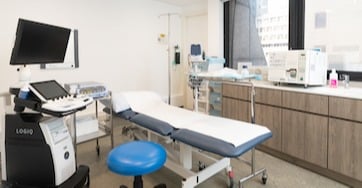Reviewed by: Dr John Wong
The health concerns of women form an intricate tapestry, interweaving aspects of reproductive health with unique, gender-specific diseases. Addressing these health issues is critical not only for the health of individual women, but also the well-being of society as a whole. There may be a misconception that colorectal cancer is predominantly a disease among men. However worldwide, colorectal cancer is the second most frequently diagnosed cancer in women after breast cancer, while it is the third most frequently diagnosed cancer in men after lung and prostate cancers (1). Preventive measures, like colonoscopy, play a central role in reducing the risk of being diagnosed and dying from colorectal cancer. Also, the close anatomical proximity of the colorectum to the uterus and bladder can confound the underlying cause of symptoms like bloating, abdominal discomfort and constipation. Therefore, being up to date with colonoscopy paired with routine gynaecological examination offer a comprehensive approach to women's health.
What is a Colonoscopy?
A colonoscopy is a medical procedure to visually inspect the inner lining of the large intestine, allowing the detection of abnormalities such as polyps, colorectal cancer, inflammation, diverticulosis and hemorrhoids. Prior to procedure commencement, intravenous sedation will be given to ensure patient comfort. The procedure involves inserting a colonoscope, which is a flexible tube with a light and a camera at the end, through the anus into the colon. The tube is gently advanced to the beginning of the colon at the cecum under visualisation via a monitor. The colonoscope is then withdrawn and the lining of the colon is examined for abnormalities. In addition to diagnostic inspection, biopsies can be taken, and growths such as polyps can be removed during the procedure. Overall, the procedure takes between 30 minutes to one hour. Colonoscopy is a commonly performed, safe, and usually well tolerated procedure in the hands of an experienced endoscopist.
Gastroscopy and Colonoscopy: What are the Differences?
Gastroscopy and colonoscopy are both endoscopic procedures used to examine different parts of the gastrointestinal tract, but they serve distinct purposes and involve different areas of focus.
Gastroscopy
Gastroscopy involves visual examination of the upper part of the gastrointestinal tract, which includes the esophagus, stomach, and duodenum (the first part of the small intestine). This procedure is primarily used to investigate symptoms like heartburn, loss of appetite, nausea, vomiting, swallowing problems, upper abdominal pain, black colored stools and unintentional weight loss, which can be caused by upper digestive inflammation/ulcer, infection or cancer.
Colonoscopy
Colonoscopy inspects the lower part of the gastrointestinal tract, specifically the colon and rectum. The same type of endoscope used in gastroscopies is inserted through the rectum to examine the entire colon. A colonoscopy is crucial for colorectal cancer screening and is used to look for polyps, cancers, and areas of inflammation or bleeding. It is recommended as a routine screening tool for colorectal cancer starting at age 45 for most individuals. Colonoscopy can also assist in the diagnosis of gastrointestinal symptoms such as changes in bowel habits, rectal bleeding, and unexplained weight loss.
When to Get a Colonoscopy?
The decision to undergo colonoscopy is often governed by a combination of patient age, family history, and symptomatology. As of 2018, the American Cancer Society lowered the starting age of colorectal cancer screening in asymptomatic individuals at average risk of colorectal cancer from 50 years old to 45 years old (2). This is in part due to observations that colorectal cancer is being increasingly diagnosed in the younger than 50 year old age group. In the United States, 20% of colorectal cancer cases now occur in those younger than 55 years old (3) These young-onset colorectal cancer cases are also more likely to present with more advanced disease and have worse prognosis. This trend of young-onset colorectal cancer has also been observed in Europe and Asia (4,5)
However, if you have a family history of colorectal cancer or advanced polyps, screening may need to commence at an earlier age. Furthermore, if there are symptoms such as unexplained abdominal discomfort, change in bowel habits, rectal bleeding or unintentional weight loss, a colonoscopy may be necessary irrespective of age. It is important to remember these guidelines serve as a starting point and individual recommendations may vary. Your healthcare provider can best guide you on the optimal timing for your colonoscopy.
Colonoscopy Prices in Hong Kong
In Hong Kong, the cost of colonoscopy can depend on procedural complexity, sedation choice and operating room charges.
How to Prepare for a Colonoscopy?
Preparation for a colonoscopy, also known as bowel preparation, is a crucial step to ensure the colon is cleared of stool to allow accurate visualisation. A few days ahead of the procedure, patients may be asked to adjust their diet to minimise fibre intake. Laxatives will also be prescribed. Hydration is important during this phase to compensate for fluid loss. Certain medications may need to be adjusted. While bowel preparation can be inconvenient, close adherence to your healthcare provider's instructions will maximise stool cleansing to ensure clear visualization of the colon and detection of any abnormalities.
Call to Action: Take control of your own health
Prevention is the cornerstone of healthcare, superseding treatment in terms of both cost-effectiveness and impact on quality of life. By adopting a proactive approach to your health, women can detect potential problems earlier, preventing the development of serious medical conditions like colorectal cancer. If you are a woman over the age of 45, have a family history of colorectal cancer/advanced polyps or have unexplained digestive symptoms, talk to your healthcare provider whether you are due for a colonoscopy. At OT&P Healthcare, we endeavour to provide you with professional care and support for your health and wellbeing.
References
-
WCRF. World Cancer Research Fund International: Worldwide cancer data. 2022 [updated 23rd March 2022. Available from: https://www.wcrf.org/cancer-trends/worldwide-cancer-data/#:~:text=There%20were%20an%20estimated%2018.1,listed%20in%20the%20tables%20below.
-
Colorectal cancer guideline: How often to have screening tests. Colorectal Cancer Guideline | How Often to Have Screening Tests | American Cancer Society. (n.d.). https://www.cancer.org/cancer/types/colon-rectal-cancer/detection-diagnosis-staging/acs-recommendations.html
- Siegel RL, Wagle NS, Cercek A, Smith RA, Jemal A. Colorectal cancer statistics, 2023. CA Cancer J Clin. 2023 May-Jun;73(3):233-254. doi: 10.3322/caac.21772. Epub 2023 Mar 1. PMID: 36856579.
- Vuik FE, Nieuwenburg SA, Bardou M, Lansdorp-Vogelaar I, Dinis-Ribeiro M, Bento MJ, Zadnik V, Pellisé M, Esteban L, Kaminski MF, Suchanek S, Ngo O, Májek O, Leja M, Kuipers EJ, Spaander MC. Increasing incidence of colorectal cancer in young adults in Europe over the last 25 years. Gut. 2019 Oct;68(10):1820-1826. doi: 10.1136/gutjnl-2018-317592. Epub 2019 May 16. PMID: 31097539; PMCID: PMC6839794.
- Sung JJY, Chiu HM, Jung KW, Jun JK, Sekiguchi M, Matsuda T, Kyaw MH. Increasing Trend in Young-Onset Colorectal Cancer in Asia: More Cancers in Men and More Rectal Cancers. Am J Gastroenterol. 2019 Feb;114(2):322-329. doi: 10.14309/ajg.0000000000000133. PMID: 30694865.

 Central General Practice
Central General Practice
 Repulse Bay
Repulse Bay
 Clearwater Bay
Clearwater Bay
 BodyWorX Clinic
BodyWorX Clinic
 Central Specialist Clinic
Central Specialist Clinic
 MindWorX Clinic
MindWorX Clinic
 Partner Clinics
Partner Clinics
 Family Clinic
Family Clinic
 OT&P Annerley Midwives Clinic
OT&P Annerley Midwives Clinic


